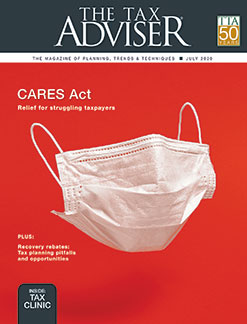- column
- From the Tax Adviser
Tentative refunds under the CARES Act in 2020
Please note: This item is from our archives and was published in 2020. It is provided for historical reference. The content may be out of date and links may no longer function.
Related
New Schedule 1-A for tips, OT, car loans, and senior deductions published
Senate bill targets preparers who break the law, expands IRS reforms
District court dismisses taxpayer’s refund claim

Under Sec. 6411, a taxpayer may file an application for a tentative carryback adjustment of the tax for a prior tax year that is affected by an NOL carryback, a business credit carryback, or a capital loss carryback.
The Coronavirus Aid, Relief, and Economic Security (CARES) Act, P.L. 116-136, reinstated and beefed up the net operating loss (NOL) carryback by allowing a five-year carryback for losses arising in tax years beginning in 2018, 2019, and 2020.
The CARES Act also corrects a technical error that prevented NOLs arising in a tax year ending in 2018 from being carried back. Taxpayers that have an NOL arising in a fiscal year beginning in 2017 and ending in 2018 may file a tentative refund claim or make an election to waive a carryback within 120 days of the March 27, 2020, enactment of the CARES Act to carry back those losses two years.
Finally, the CARES Act allows corporations to immediately claim unused alternative minimum tax (AMT) credits. When the corporate AMT was repealed, any unused AMT credits could be claimed as refundable credits over the four tax years beginning in 2018, 2019, 2020, and 2021. The CARES Act provides that the credits can be claimed fully in tax years beginning in 2018 and 2019.
Under the CARES Act, a corporation can elect to take the entire refundable AMT credit in 2018, rather than claim the remaining half of the credit in 2019. If a corporation wishes to claim the balance of the credit in 2019, it can do so on its income tax return. If the corporation wishes to claim the entire credit in 2018, it can either file an amended return for 2018 or file for a tentative refund on Form 1139, Corporation Application for Tentative Refund.
Taxpayers commonly file Form 1139 or Form 1045, Application for Tentative Refund, to claim a tentative refund based on an NOL carryback. Form 1139 or 1045 must generally be filed within one year following the close of the taxpayer’s tax year and after the taxpayer files its income tax return for the year in which the loss arose. In Notice 2020-26, the IRS postponed the due date for filing Forms 1139 or 1045 for an NOL that arose in a tax year that began in 2018 and ended on or before June 30, 2019, to six months after the normal due date of the form (e.g., June 30, 2020, for a tax year ended Dec. 31, 2018). Once the form is filed, the IRS has 90 days to conduct a limited examination or review of the application for omissions or errors and allow or deny the application. Taxpayers should note the temporary procedures the IRS has put into place to allow faxing of Forms 1139 and 1045 filed to claim AMT credit refunds and to carry back NOLs (see IRS information).
Finally, while this discussion provides a general overview of the refund mechanisms available to taxpayers, taxpayers should carefully analyze specific issues and ensure they are compliant with their filings, based on the most up-to-date IRS guidance in response to the CARES Act.
For a detailed discussion of the issues in this area, see “Tax Practice & Procedures: Liquidity and Cash Management Strategies During a Pandemic,” in the July 2020 issue of The Tax Adviser.
— Shamik Trivedi, J.D., LL.M.; Ellen Martin, CPA; and Dustin Stamper, E.A.
The Tax Adviser is the AICPA’s monthly journal of tax planning, trends, and techniques.
Also in the July issue:
- A look at tax savings opportunities in the CARES Act.
- A discussion of tax planning and pitfalls with recovery rebates.
- An analysis of the personal holding company tax.
AICPA members can subscribe to The Tax Adviser for a discounted price of $85 per year. Tax Section membership includes a one-year subscription to The Tax Adviser.


















